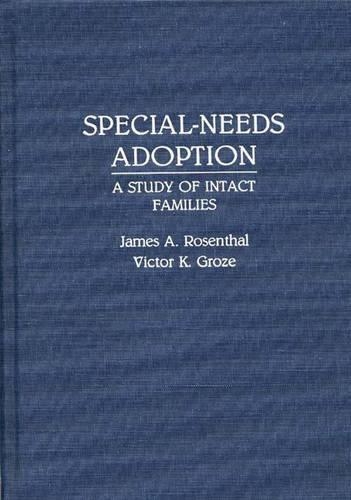
Special-Needs Adoption: A Study of Intact Families
(Hardback)
Publishing Details
Special-Needs Adoption: A Study of Intact Families
By (Author) Victor K. Groza
By (author) James Rosenthal
Bloomsbury Publishing PLC
Praeger Publishers Inc
28th February 1992
United States
Classifications
Tertiary Education
Non Fiction
362.7
Physical Properties
Hardback
264
Description
This volume reports the results of a large-scale survey of families who adopted children with "special needs": older children, minority children, handicapped children, or sibling groups. In contrast to much of the current literature which focuses on adoption disruption, this study shifts the focus of inquiry to intact families. It assesses perceptions of social work services, parent-child relationships, family functioning, child behaviour, school performance, and other aspects of adoptive family life. Rosenthal and Groze compare outcomes for different types of adoptions, including adoptions of children of different ages, adoptions by minority families, transracial adoptions, single-parent adoptions, adoptions by less educated and less wealthy families, adoptions by foster parents, adoptions of children with handicaps, and sibling group adoptions. The authors offer solid advice, based on their sample of 800 respondents, regarding various aspects of practice in the field of adoption, including selection of families, preparation of families and children, and useful follow-up services.
Reviews
Adoption is one of several child welfare services that have undergone major policy and practice reforms in the past 20 years. The resulting emergence of special-needs adoption as a new social welfare program is best represented by the shift in focus from finding children for childless couples to finding families for children who need them. Special-needs adoption places older children, children of color, those who have physical or mental disabilities, and children in sibling groups with many different types of families. In this highly readable book, which reports on their study of 799 adoptive families, Rosenthal and Groze make an important contribution to understanding the families' experiences in adopting children who would formerly have been considered unadoptable. Their work confirms practice wisdom about the high rates of success and family satisfaction in special-needs adoption and underscores the need for highly specialized recruitment, preparation, and post-placement supports for adoptive families.-Choice
Rosenthal and Groze provide a valuable service by documenting, with richness and breadth, the outcomes of adoption and how they relate to the characteristics of adoptive parents and adopted children. By providing added insight into the relationship of the makeup of adoptive families and their outcomes, they are both able to raise further questions for researchers in this area as well as offer practice recommendations for practitioners in the area....It is important reading for anyone researching or practicing in this area.-Children and Youth Services Review
"Rosenthal and Groze provide a valuable service by documenting, with richness and breadth, the outcomes of adoption and how they relate to the characteristics of adoptive parents and adopted children. By providing added insight into the relationship of the makeup of adoptive families and their outcomes, they are both able to raise further questions for researchers in this area as well as offer practice recommendations for practitioners in the area....It is important reading for anyone researching or practicing in this area."-Children and Youth Services Review
"Adoption is one of several child welfare services that have undergone major policy and practice reforms in the past 20 years. The resulting emergence of special-needs adoption as a new social welfare program is best represented by the shift in focus from finding children for childless couples to finding families for children who need them. Special-needs adoption places older children, children of color, those who have physical or mental disabilities, and children in sibling groups with many different types of families. In this highly readable book, which reports on their study of 799 adoptive families, Rosenthal and Groze make an important contribution to understanding the families' experiences in adopting children who would formerly have been considered unadoptable. Their work confirms practice wisdom about the high rates of success and family satisfaction in special-needs adoption and underscores the need for highly specialized recruitment, preparation, and post-placement supports for adoptive families."-Choice
Author Bio
JAMES A. ROSENTHAL is Associate Professor of Social Work at the University of Oklahoma, Norman. Dr. Rosenthal worked for eight years in public child welfare, both in direct practice and in research and evaluation. He has conducted research and published in several child welfare areas, including child abuse and neglect, home-based treatment, juvenile justice, and special-needs adoption. He is an adoptive father. VICTOR K. GROZE is Assistant Professor at the University of Iowa School of Social Work in Iowa City. Dr. Groze has over ten years of clinical and supervisory experience working with families in adoption, adolescent services, and substance abuse treatment. His research has focused on institutional abuse and neglect and special-needs adoption.
